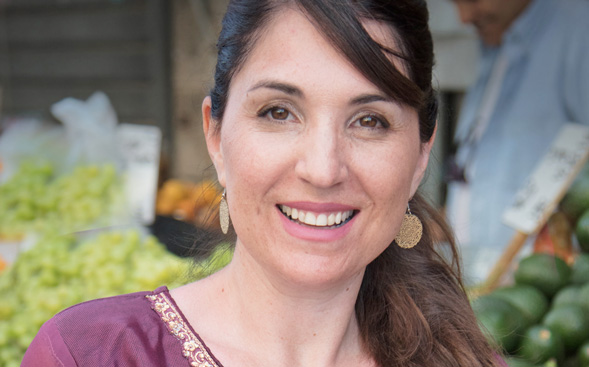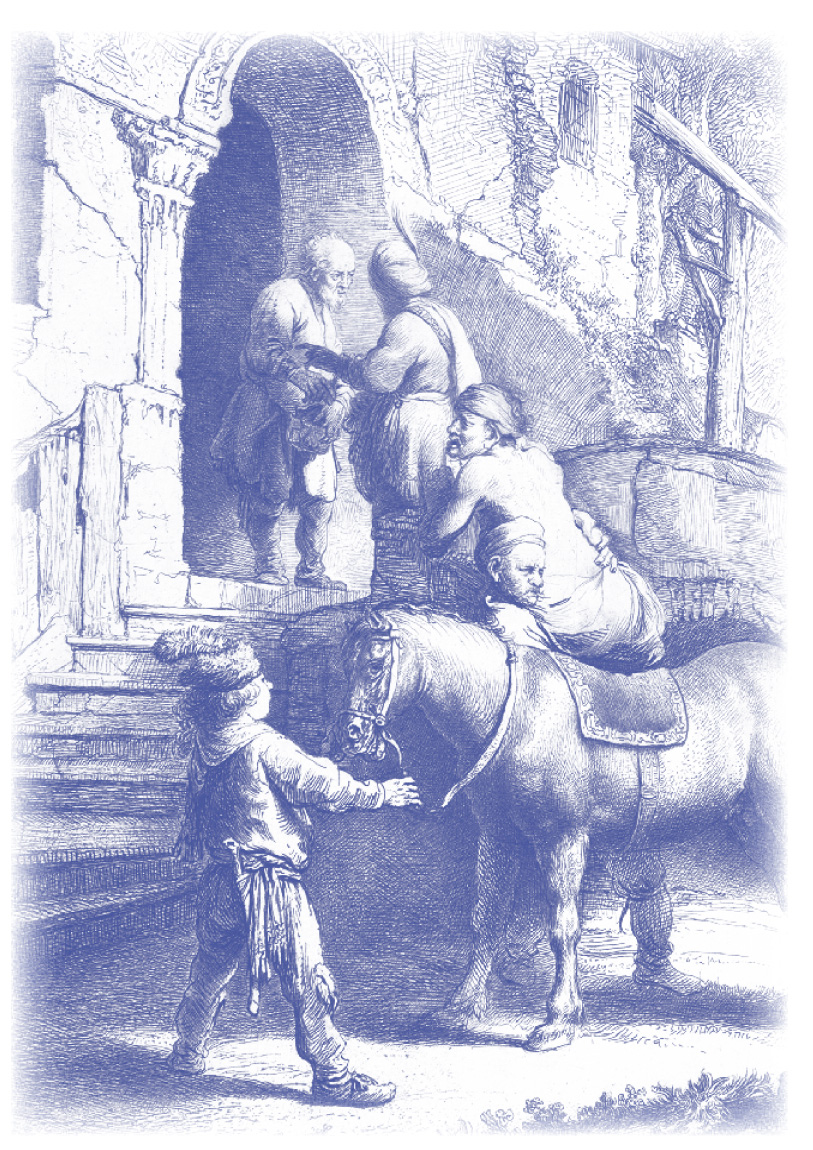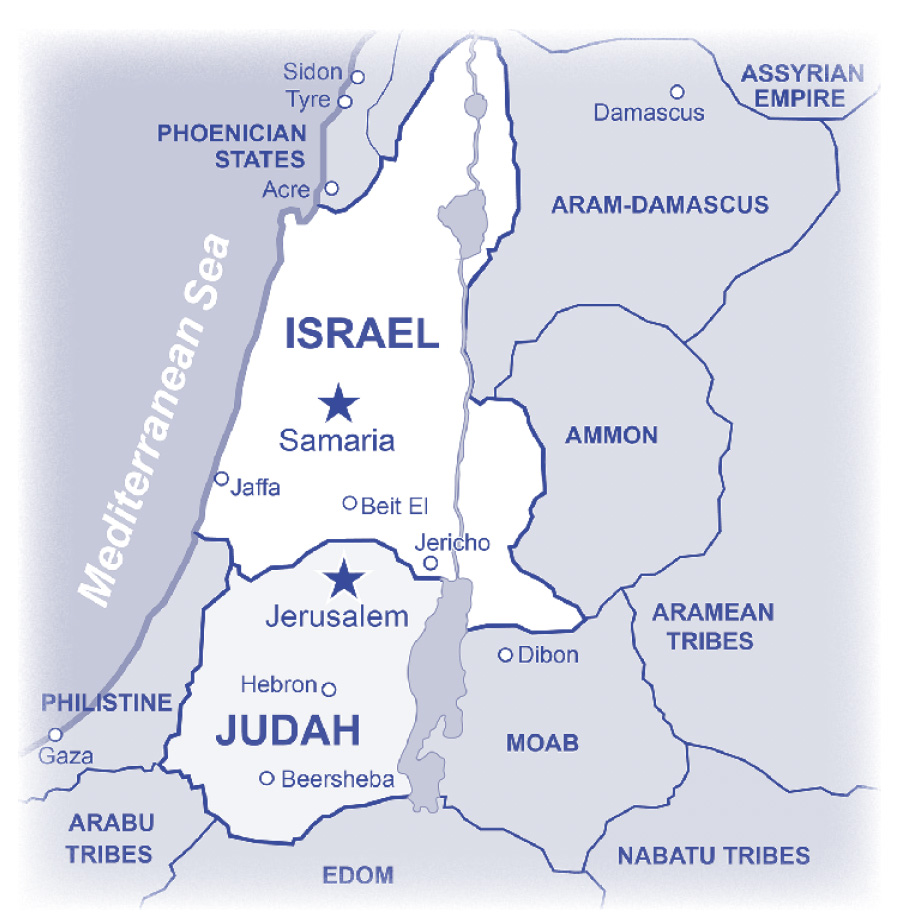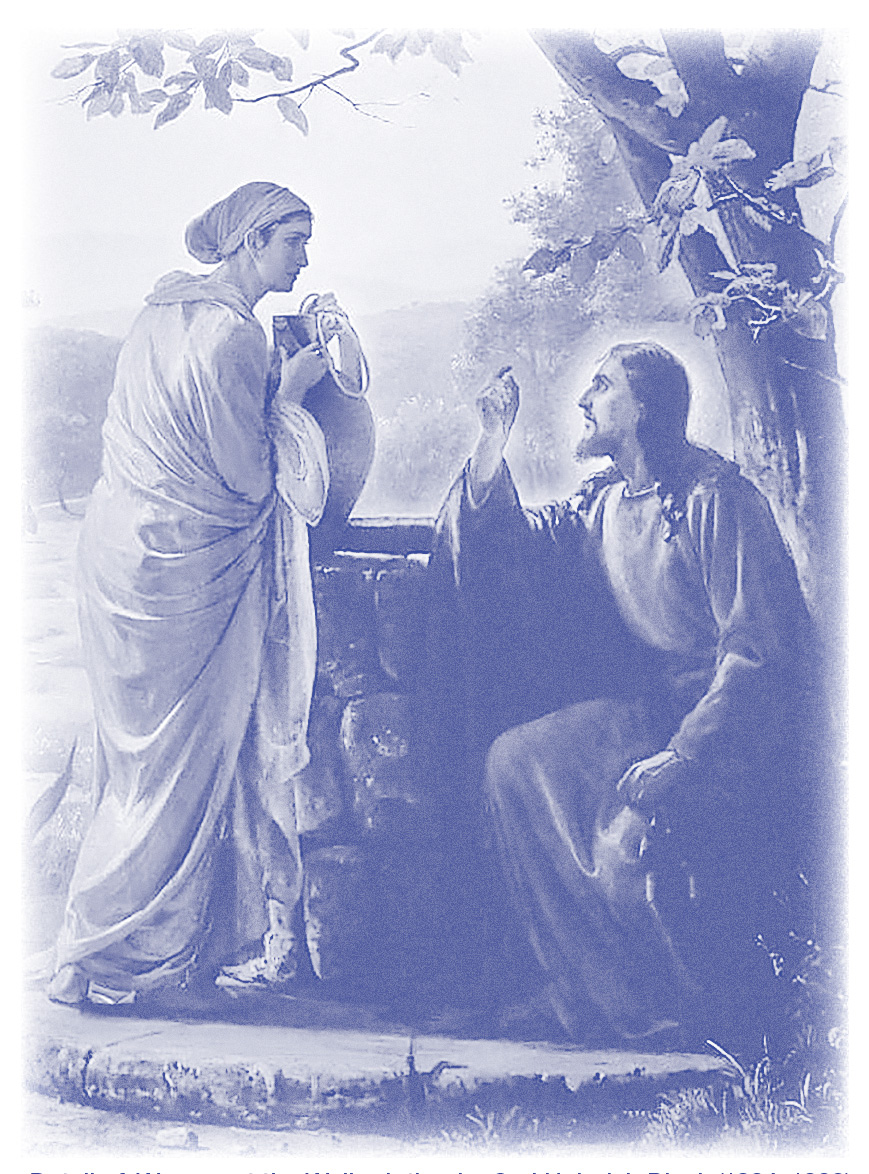
FROM SARAH, OUR SABRA
ON THE GROUND IN ISRAEL
Dear Friend,
Greetings from the Holy Land. As part of my continued efforts on The Invitation — an evangelistic worship project for the Middle East — I have been privileged to work with young young worship leaders in the region who speak Arabic or Farsi. The latest song we recorded in Farsi tells the story of the Good Samaritan.

The Metropolitan Museum of Art, New York
I chose this parable because it portrays God’s heart through the Samaritan man’s actions. In our video, we present the young man who is assaulted on the Jericho road as a non-believer, the Samaritan represents God the Father, the innkeeper and his family symbolize the family of Believers in Yeshua/Jesus as Messiah, and the robbers reflect Satan or the troubles of this world.
Using this imagery, we created a compelling Gospel message about God’s love and protection. We filmed the video on the winding road that leads east from Jerusalem to Jericho — the area Yeshua mentioned in His parable in Luke chapter 10. If you have toured Israel, you may have traveled on this road.
Recently, I was on such a tour bus. We left the Mount of Olives and began the long descent eastward toward the Dead Sea — the lowest point on Earth. Shortly after we left Jerusalem, our guide pointed out a sizable stone building that was owned and operated by the Catholic Church.
As we passed the building on the side of the road, the guide told us that it was “The Inn of the Good Samaritan.” I chuckled when I heard that, and wondered, “Who really believes that this is where it happened?” Apparently, some people forget that the Good Samaritan story was not a historical event. Still, it’s important for us to understand the reason why Yeshua told the parable.
THE PARABLE OF THE GOOD SAMARITAN
An expert in Jewish Law, wanting to test Yeshua, asked, “Teacher, … what must I do to inherit eternal life?” (Luke 10:25). Yeshua answered by asking the man what the Law specified about experiencing eternal life. The expert answered, “‘Love the Lord your God with all your heart and with all your soul and with all your strength and with all your mind’; and ‘Love your neighbor as yourself’” (Luke 10:27). Yeshua commended the man’s correct answer. But then the man, seeking to justify himself, further challenged Yeshua by asking, “And who is my neighbor?” (Luke 10:29).
Yeshua responded by telling the story recorded in Luke 10:30–35. A man traveling to Jericho was beaten by robbers who stole his belongings and left him half dead. Three other travelers — a Levite, a priest, and a Samaritan — passed by the injured man. The Levite and the priest, men of high standing, should have honored and obeyed the Law through their actions, but they did not. Instead, they crossed the road and avoided the man rather than helping him.
The Samaritan was the third person who encountered the wounded man. Yeshua made a calculated choice to include a Samaritan in His story, since Jews despised, and even hated, the Samaritans.

BACKGROUND OF THE SAMARITANS
The Samaritans descended from the people of the Northern Kingdom of Israel, which had split from Judah (the Southern Kingdom) after King Solomon’s death (around 930 B.C.). A major element of this split was a separation of the place of worship.
The people of Judah insisted that the sacrifices dictated by God in the Law of Moses could only occur in the Temple in Jerusalem. But the kings of Israel feared that if their people went south to Jerusalem to worship, they would support the king of Judah. To mitigate this risk, the northern kings established alternate places of worship: One was in Samaria, and one was in Tel Dan. The Jews in the south considered any site other than Jerusalem blasphemous.
During the centuries that followed, both rival kingdoms became increasingly disobedient to God. Finally, the Assyrians destroyed the Northern Kingdom in 722 B.C. and took many of the residents to Assyria as captives. Those who remained in the land eventually intermarried with people whom the Assyrians had relocated there. Thus, these half-Jewish people, whose spiritual center was Samaria, became known as the Samaritans.
In 586 B.C., the Babylonians destroyed Jerusalem (and Solomon’s Temple) and took most of the people of Judah into exile in Babylon. But after 70 years, a remnant of those exiles returned to Jerusalem with the blessing of King Cyrus. They planned to restore the city and rebuild the Temple, as recorded in the Books of Ezra and Nehemiah.
INCREASING ANTAGONISM
The people of Samaria sought to undermine or stop any restoration. While they failed, their opposition intensified the animosity between them and the Jews in the south. Throughout the centuries that followed, the southern Jews had a “holier than thou” attitude toward the Samaritans, whom they considered no longer Jewish.

In Yeshua’s time, the Jews despised the Samaritans so much that they would not travel through Samaria on their way to and from Jerusalem. Yeshua used this contempt in His parable to make a point. The Samaritan — a man whom Jews considered an apostate — was the only person who stopped. He treated the injured man’s wounds, then took the man to an inn and cared for him there. Afterward, the Samaritan paid the innkeeper to care for the man and promised to return and pay any additional expenses. Thus, the Samaritan was the only one in the story who actually fulfilled the Law.
YESHUA’S EXAMPLE
Yeshua did more than tell stories about Samaritans. He also showed His concern for them when He purposefully traveled through Samaria. John chapter 4 records how Yeshua encountered a Samaritan woman at the well. When the woman met Yeshua, a Jew, she noted the longstanding controversy between their people regarding the proper place to worship God.
After talking with Yeshua, the woman returned to her village, spreading the news that she may have met the Messiah. Thus, the Samaritans went to see Yeshua for themselves. At their urging, He stayed with them for two days, and many became Believers, noting, “we have heard for ourselves, and we know that this Man really is the Savior of the world” (John 4:42).
THE SAMARITANS TODAY
Today, a small community of about 800 Samaritans remains in Israel. These descendants of the people mentioned in the Bible are generally found in two areas: Some live on the Mediterranean coast, while others live in Samaria, as they did centuries ago. They pray using an ancient form of Hebrew and seek to fulfill the Law of Moses. For instance, during the Feast of Passover, they sacrifice a lamb. They also practice the laws about menstrual impurity and follow many other regulations that most Israelis no longer keep.
Israel’s government does not consider the Samaritans to be Jewish. As a result, they cannot be officially married by the government (only Jews can marry in Israel, according to rabbinical law). They are not considered descendants of the Israelites. Rather, they are regarded as people who moved to this land and converted to Judaism.
Most rabbis in Israel also hold them in low regard. These religious leaders do not recognize the Samaritans’ customs or obedience to the Law of Moses as signs of their connection to the nation of Israel. As a result, Jews and Samaritans continue in an antagonism similar to what their ancestors experienced in the first century.
LOVING OUR NEIGHBORS
Yeshua challenged the negative attitudes that the Jews had toward this minority. In both His story and His actions, Yeshua illustrated genuine love for a neighbor — caring and sacrificing for them, seeking their good and their salvation. This unconditional love is what God shows to all humanity.
“Yet a time is coming and has now come when the true worshipers will worship the Father in the Spirit and in truth, for they are the kind of worshipers the Father seeks” (John 4:23).
Who are the “Samaritans” in your society? Yeshua’s teaching and example challenge us to love these people and to contend for their salvation. How can we consider ourselves true worshipers of God if we do not follow His Word?
Im tirdefu lada-at oto —
“Press on to know HIM!” (Hosea 6:3 NLT),
Sarah Liberman
P.S. How has someone been a “Good Samaritan” to you? When have you loved your neighbor as you love yourself, especially someone who is not like you? Write to staff@levitt.com or PO Box 12268, Dallas TX 75225 and tell me your story. I’d love to hear it! ✡
 : Seeing is Believing
: Seeing is Believing
It’s one thing to read about Biblical events and locations. But seeing those places is a unique experience. You won’t read your Bible the same way when those stories jump off the page. We have developed a Bible study tour that could enhance your spiritual walk while giving you a world-class experience. While many groups do not travel north of the Galilee or south of Bethlehem, our itinerary takes you to Israel’s northernmost point and to its southern border at the Red Sea. Come and see the beauty of this covenant land for yourself. If you are a pastor, contact us about the church packages we offer.
To see the Bible come alive in your own life, please contact Sandra, our travel manager, at 214-696-9760, travel@levitt.com, or levitt.com/tours. She can help you prepare for your journey of a lifetime!
| Deluxe — Israel | October 16–26 | $5,788 |
| Grand Petra — Israel & Petra | October 16–29 | $7,288 |
| Deluxe — Israel | March 25–April 4 | TBD |
| Grand Petra — Israel & Petra | March 25–April 7 | TBD |
A Note from David and Kirsten Hart

YOU CAN’T TAKE IT WITH YOU
When some parishioners discover that their pastor will be preaching on giving, they skip that Sunday service. Most people don’t like to hear that they should give or need to give more. And no one enjoys being guilted into giving to the Lord’s work. Still, we should give cheerfully (2 Cor. 9:7).
Well, we’ve got good news for you. We realize that giving above and beyond a tithe to your church may be difficult for some folks. Even so, our ministry relies on this type of giving. The good news is that you can help continue our Gospel outreach, even after you are “promoted” to your Heavenly home.
IF YOU WILL
An estate plan — including a will — is vitally important for you to protect your heirs and your assets. You can’t take any of your possessions with you, but through your will, you can use the resources that you leave behind to bless your children, grandchildren, and even ministries.
My parents created their will and designated 10% of their estate to several ministries. I didn’t know it in advance, but they allotted a percentage to Zola Levitt Ministries. What a blessing and honor to know that their legacy will help ZLM continue to reach the nations with the message of Yeshua through Our Jewish Roots and our other outreaches.
Please contact our office to learn how easy it is to add ZLM to your will. You can also click on “Find a Christian Lawyer” at www.ChristianLegalSociety.org to access their free directory. Then, select your state and “Wills/Trusts/Estates/Probate.” While no one likes to contemplate his or her own death, preparing in advance will make a difference not only for your eternity but also for those who remain on this Earth after you become “absent from the body” and are “present with the Lord” (2 Cor. 5:8).
Sha’alu shalom Yerushalayim! —
“Pray for the peace of Jerusalem!” — Psalm 122:6,
David & Kirsten
P.S. Leaving some of your financial assets to a ministry like ZLM can have a positive impact on many lives for eternity! Our survival is in your hands. And this outreach is compelled to do more than just survive — we should thrive. Would you help us keep teaching the Jewish roots of Christianity? ✡
Our Jewish Roots TV programs in March
Zola Levitt Presents began airing more than four decades ago, and it became Our Jewish Roots in 2020. This television ministry has continually broadcast weekly TV programs since 1979. This month, Kirsten and I (David) start our seventh year as the studio hosts. We are honored to have been involved in every series, program, and song during these years. Dr. Seif, here’s to many more years together on this vitally important program!
Yeshua is undeniably the Prince of Peace. The television series described below was so powerful when it was first released that we feel compelled to offer an encore presentation. We trust that you will rediscover even more life-changing truths as you watch it this month.


Sar Shalom: Prince of Peace
Explore what it means to walk in the footsteps of Israel’s Messiah. Dr. Jeffrey Seif provides a passage-by-passage exposition of Jesus’ principal teachings in the Sermon on the Mount. These are brought to life through on-location production in Israel and real-world dramatizations by Israeli Believers.
- Crimes of the Heart
- Matthew 5:17–20 records Jesus’ thoughts on the Torah (the Jewish Law) and how He fulfills it. Our Lord also emphasizes how sinful actions begin in the heart (5:21–30).
- The Law Brought to Life
- Jesus speaks about divorce and the marriage bond in Matthew 5:31–32, and other human bonds in 5:33–37. Verses 38–42 deal with “going the extra mile” and how to be gracious even toward the ungracious.
- Models of Behavior
- Jesus teaches how to deal with enemies (Matt. 5:43–48). In 6:1–4, He emphasizes doing good to please God rather than men. The Lord’s teachings on prayer follow in 6:5–15.
- Eternal Investments
- Matthew 6:16–18 notes that fasting pays dividends. Yet in verses 19–21, we find that storing up treasures on Earth does not. God wants Believers to be gracious, not greedy, as Jesus emphasized in verses 22–23.
- God’s Material Provisions
- Jesus explains that people will serve either God or possessions (Matt. 6:24), while blessings abound to those who serve Him (6:25–34). Considering how blessed we forgiven sinners are, we must not rush to judge others (7:1–6).








